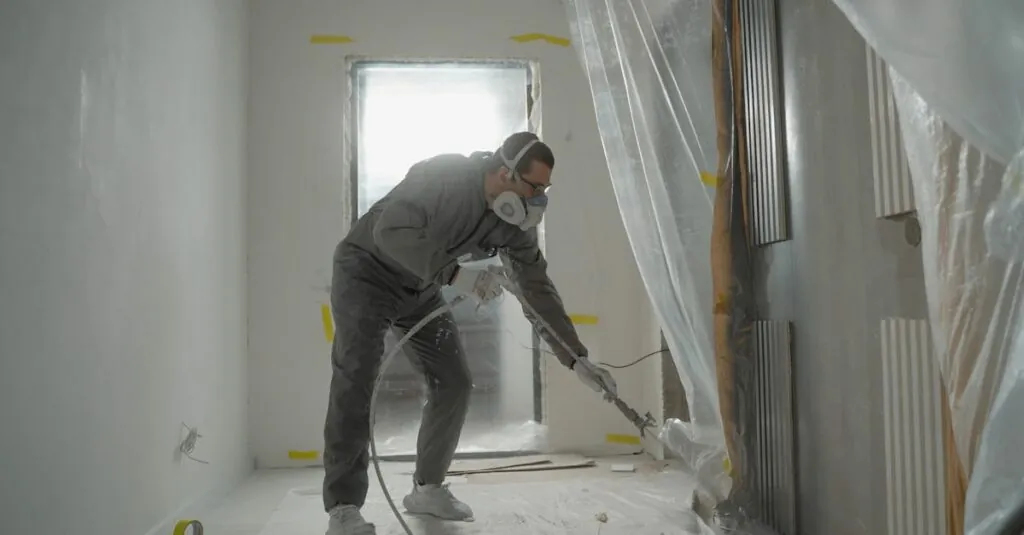Table of Contents
ToggleThinking about diving into the world of home improvement in New Jersey? Before grabbing that tool belt and channeling your inner Bob the Builder, there’s one crucial step: getting a contractor license. It’s not just a piece of paper; it’s your golden ticket to transforming homes while avoiding the wrath of the law.
Overview Of Home Improvement Contractor License In NJ
Home improvement contractors in New Jersey must hold a specific license to operate legally in the state. This requirement aims to protect consumers from unqualified workers and ensures compliance with local building codes. Applicants must provide proof of experience, typically requiring a four-year work history in home improvement or related fields.
The application process for the license involves several steps. First, candidates need to submit an application form along with the appropriate fee. A criminal background check is then conducted to ensure the applicant meets ethical standards. Passing the business and law examination further confirms their understanding of relevant regulations.
License holders must maintain their credentials through continuing education. A mandatory five hours of training every two years ensures contractors stay informed about updates in New Jersey’s building codes, industry standards, and safety practices.
Failure to comply with licensing requirements can result in severe penalties. Unlicensed contractors may face fines and civil charges, making it crucial for contractors to secure the necessary permits before commencing projects. Homeowners seeking improvement services prefer licensed professionals, as this provides assurance of quality and legality in home transformations.
New Jersey offers a comprehensive online resource for contractors looking to apply for or verify their licenses. Accessing this portal simplifies the process and allows prospective contractors to stay up to date with any changes in licensing regulations.
Requirements For Obtaining A License
Obtaining a contractor license in New Jersey requires meeting specific criteria to ensure qualified professionals operate in the home improvement sector.
Age And Experience Criteria
Applicants must be at least 18 years old. Relevant experience is crucial; candidates should demonstrate at least three years of hands-on experience in the home improvement field. This experience can include working for licensed contractors or owning a business in related areas. Such requirements help ensure that contractors possess the necessary skills to perform quality work. New Jersey emphasizes these criteria to protect consumers from unqualified individuals.
Education And Examination
A high school diploma or GED is required for applicants before they can proceed. Candidates need to pass a business and law examination, which tests their knowledge of regulations and compliance standards. Preparation courses may be beneficial in achieving success on this test. Upon passing, applicants must submit documented proof of their exam results with their license application. This structured approach ensures that only knowledgeable individuals attain a license, reinforcing standards within the industry.
Application Process
The application process for obtaining a home improvement contractor license in New Jersey involves several key steps. Submitting documentation and fees occurs early in this process.
Documentation Needed
Applicants must gather essential documentation to complete the application. Proof of identity includes a government-issued photo ID. A criminal background check confirmation is necessary, ensuring the applicant meets legal requirements. Experience verification is also needed; documentation showing a minimum of three years working in the home improvement field suffices. Proof of education, such as a high school diploma or GED, is required. Lastly, applicants must submit proof of passing the business and law examination.
Fees And Submission
Fees vary depending on the specific license type sought by the applicant. Typically, the application fee ranges from $100 to $200; however, exact amounts can change. Payment methods often include checks, money orders, or credit cards. Submissions occur through both online platforms and traditional mail; applicants should check the latest guidelines on the New Jersey Division of Consumer Affairs website. After submission, applicants usually receive notification of their application status within a few weeks.
Maintaining Your License
Maintaining a home improvement contractor license in New Jersey requires diligence. Contractors must renew their licenses periodically and fulfill continuing education requirements.
Renewals And Continuing Education
License renewals occur every two years. Completing five hours of approved continuing education during this period is essential. Topics may include updates on building codes, safety practices, and legal obligations. Registered providers offer credible courses, enhancing contractors’ knowledge and skills. Failure to meet this requirement can lead to lapses in licensing.
Compliance And Regulations
Staying compliant with state regulations is vital for licensed contractors. They must adhere to local building codes, safety standards, and consumer protection laws. Regular inspections conducted by governing bodies ensure adherence. Non-compliance can result in fines, license suspension, or revocation. Contractors should regularly review state regulations and any updates, as these can impact their operations and reputation in the industry.
Benefits Of Hiring Licensed Contractors
Hiring licensed contractors ensures adherence to local building codes and regulations. Compliance with these regulations protects homeowners from potential liabilities associated with unqualified work. Licensed contractors maintain updated knowledge of safety practices, which minimizes risks during home improvement projects.
Consumer protection is another essential benefit of hiring licensed professionals. These contractors often provide warranties and guarantees, giving homeowners peace of mind regarding the quality of their work. In case of disputes, licensed contractors offer avenues for resolution through professional associations and state regulations.
Skillful execution is a hallmark of licensed contractors. They possess verifiable experience, having complied with rigorous requirements to obtain their licenses. This expertise translates into higher quality workmanship, reducing the need for future repairs and associated costs.
Local resources readily identify licensed contractors, making the hiring process straightforward. Homeowners can verify licenses through state-run online databases, increasing trust before entering contracts. This transparency fosters confidence in the contractor’s abilities and practices.
Legal protection for homeowners is fortified by hiring licensed contractors. In New Jersey, homeowners can seek recourse through licensing boards if issues arise during or after the project. Such protection provides a safety net, ensuring that homeowners do not bear the financial burden of negligent work.
Smoother project management characterizes licensed contractors. They understand project timelines, making them adept at adhering to schedules. Time management leads to efficient project completion, permitting homeowners to enjoy their remodeled living spaces sooner.
Choosing licensed contractors ultimately safeguards investments. Quality workmanship enhances a property’s value, encouraging future buyers. Homeowners benefit from both immediate results and long-term appreciation.
Obtaining a home improvement contractor license in New Jersey is crucial for anyone looking to work legally and effectively in the industry. This license not only ensures compliance with local regulations but also protects consumers from unqualified contractors. By meeting the necessary criteria and completing the application process, contractors can demonstrate their commitment to quality and professionalism.
Homeowners benefit significantly when hiring licensed professionals, as they can expect adherence to building codes and a higher standard of workmanship. The ongoing education requirements further ensure that licensed contractors remain knowledgeable about the latest industry practices. Ultimately, investing in a contractor license is a step toward building trust and ensuring successful home improvement projects.




